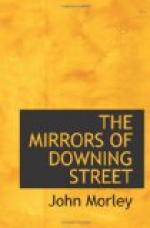His experience of Downing Street filled him up to the brim with contempt for politicians. It was not so much their want of brains that troubled him, but their total lack of character. Only here and there did he come across a man who had the properties of leadership in even a minor degree: for the most part they had no eyes for the horizon or for the hills whence cometh man’s salvation; they were all ears, and those ears were leaned to the ground to catch the rumbles of political emergencies.
To find men at the head of so great a nation with no courage in the heart, with no exaltation of captaincy in the soul, without even the decency to make sacrifices for principle, made him bitterly contemptuous. At first he could scarcely bridle his rage, but as years went on he used to say that the politicians had deepened his faith in Providence. God was surely looking after England or she would have perished years agone. In his old age he ceaselessly quoted the lines of William Watson:
“Time, and the Ocean, and some fostering
star
In high cabal have made us what we are”;
and damned the politician with all the vigour of the Old Testament vernacular.
I have often listened to a minister’s confidential gossip about Lord Fisher; nothing in these interesting confidences struck me so much as the self-satisfaction of the little minister in treating the man of destiny as an amusing lunatic.
MR. ASQUITH
THE RT. HON. HERBERT HENRY ASQUITH
Born at Morley, Yorkshire, 1852. Educ.: City of London School; Balliol College, Oxford; gained 1st class, Lit. Hum. 1874; Barrister Lincoln’s Inn, 1876; Q. C. 1890; Home Sec’y, 1892-95; Ecclesiastical Commissioner, 1892-95; Chancellor of the Exchequer, 1905-8; Sec’y for War, 1914; 1st Lord of the Treasury and Prime Minister, 1908-16; LL.D. Edinburgh, Glasgow, Cambridge, Leeds, St. Andrews, and Bristol.
[Illustration: RT. HON. HERBERT HENRY ASQUITH]
CHAPTER IV
MR. ASQUITH
"Not to mention loss of time, the tone of their feelings is lowered: they become less in earnest about those of their opinions respecting which they must remain silent in the society they frequent: they come to look upon their most elevated objects as unpractical, or at least too remote from realization to be more than a vision or a theory: and if, more fortunate than most, they retain their higher principles unimpaired, yet with respect to the persons and affairs of their own day, they insensibly adopt the modes of feeling and judgment in which they can hope for sympathy from the company they keep."—JOHN STUART MILL.
Nothing in Mr. Asquith’s career is more striking than his fall from power: it was as if a pin had dropped.
Great men do not at any time fall in so ignominious a fashion, much less when the fate of a great empire is in the balance.




